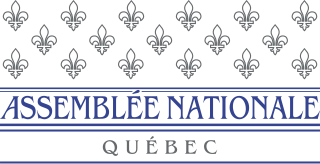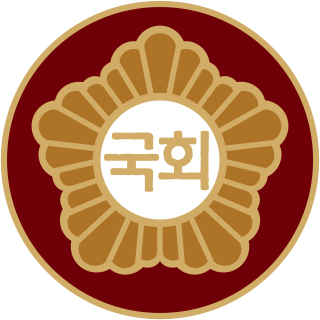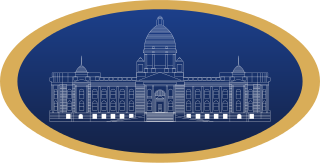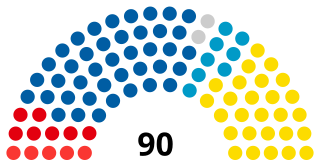
The International Astronomical Union is an international non-governmental organization (INGO) with the objective of advancing astronomy in all aspects, including promoting astronomical research, outreach, education, and development through global cooperation. It was founded on 28 July 1919 in Brussels, Belgium and is based in Paris, France.

A member of the Senedd is a representative elected to the Senedd. There are sixty members, with forty members chosen to represent individual Senedd constituencies, and twenty to represent the five electoral regions of the Senedd in Wales.

The National Assembly is the lower house of the bicameral French Parliament under the Fifth Republic, the upper house being the Senate. The National Assembly's legislators are known as députés, meaning "delegate" or "envoy" in English; etymologically, it is a cognate of the English word deputy, the standard term for legislators in many parliamentary systems.

The National Assembly of Quebec is the legislative body of the province of Quebec in Canada. Legislators are called MNAs. The lieutenant governor of Quebec and the National Assembly compose the Legislature of Quebec, which operates in a fashion similar to those of other Westminster-style parliamentary systems. The assembly has 125 members elected first past the post from single-member districts.

The National Assembly is the unicameral legislature of Kuwait. The National Assembly met in Kuwait City. The National Assembly is made up of 50 elected members and 16 directly appointed government ministers.

The National Assembly of the Republic of Korea, often shortened to the National Assembly, is the unicameral national legislature of South Korea. Elections to the National Assembly are held every four years. The latest legislative elections was held on 10 April 2024. The current National Assembly held its first meeting, and also began its current four year term, on 30 May 2024. The next Speaker was elected 5 June 2024. The National Assembly has 300 seats, with 253 constituency seats and 47 proportional representation seats; 30 of the PR seats are assigned an additional member system, while 17 PR seats use the parallel voting method.

The National Assembly is the unicameral legislature of Serbia. The assembly is composed of 250 deputies who are proportionally elected to four-year terms by secret ballot. The assembly elects a president (speaker) who presides over the sessions.

The National Assembly of Pakistan is the lower house of the bicameral Parliament of Pakistan, with the upper house being the Senate. As of 2023, the National Assembly has a maximum membership of 336, of which 266 are directly elected by an adult universal suffrage and a first-past-the-post system to represent their respective constituencies, while 60 are elected on reserved seats for women and religious minorities from all over the country. Members hold their seats for five years or until the house is dissolved by the President on the advice of the Prime Minister. The house convenes at the Parliament House, Red Zone, Islamabad.

The National Assembly is the general representative body of Slovenia. According to the Constitution of Slovenia and the Constitutional Court of Slovenia, it is the major part of the distinctively incompletely bicameral Slovenian Parliament, the legislative branch of the Republic of Slovenia. It has 90 members, elected for a four-year term. 88 members are elected using the party-list proportional representation system and the remaining two, using the Borda count, by the Hungarian and Italian-speaking ethnic minorities, who have an absolute veto in matters concerning their ethnic groups.

There are three types of elections in Nepal: elections to the federal parliament, elections to the provincial assemblies and elections to the local government. Within each of these categories, there may be by-elections as well as general elections. Currently three electoral systems are used: parallel voting for the House of Representatives and provincial assemblies, single transferable vote for the National Assembly, and first-past-the-post for local elections.
The State Legislative Assembly, or Vidhana Sabha, or Saasana Sabha, is a legislative body in each of the states and certain union territories of India. In 28 states and 8 union territories, there is a unicameral legislature which is the sole legislative body. In 6 states, the legislative assembly is the lower house of their bicameral legislature with the upper house being the State Legislative Council. 5 union territories are governed directly by the Union Government of India and have no legislative body.

The National Assembly is the directly elected house of the Parliament of South Africa, located in Cape Town, Western Cape. It consists of four hundred members who are elected every five years using a party-list proportional representation system where half of the members are elected proportionally from nine provincial lists and the remaining half from national lists so as to restore proportionality.

The National Assembly is the lower chamber of Namibia's bicameral Parliament. Its laws must be approved by the National Council, the upper house. Since 2014, it has a total of 104 members. 96 members are directly elected through a system of closed list proportional representation and serve five-year terms. Eight additional members are appointed by the President. Since 2015, SWAPO member Peter Katjavivi has been the Speaker of the National Assembly.

The National Assembly is Zambia's unicameral legislative body. Between 1972 and 1990, Zambia was a one-party state with the United National Independence Party (UNIP) as the sole legal party.

The House of Representatives is the lower chamber of Nigeria's bicameral National Assembly. The Senate is the upper chamber.

The Andhra Pradesh Legislative Assembly is the lower house of the bicameral legislature of the Indian state, Andhra Pradesh.
State Governments of India are the governments ruling over the 28 states and 3 union territories of India with the head of Council of Ministers in every state being the Chief Minister. Power is divided between the Union government and the state governments.

The Maharashtra Legislative Assembly is the lower house of the bicameral legislature of Maharashtra state in western India. It consists of 288 members directly elected from single-seat constituencies. The Assembly meets at Vidhan Bhavan in Mumbai, though the winter session is held in Nagpur. Along with the Maharashtra Legislative Council, it comprises the legislature of Maharashtra. The presiding officer of the Assembly is the Speaker. Members of the Assembly are directly elected by the people of Maharashtra through elections held every five years, unless the Assembly is dissolved earlier. The current Assembly was elected in October 2019.

The Legislative Assembly of the National Capital Territory of Delhi, also known as the Delhi Vidhan Sabha, is a unicameral legislature of the union territory of Delhi in India. Delhi Legislative Assembly is the legislative arm of the Government of Delhi. At present, it consists of 70 members, directly elected from 70 constituencies. The tenure of the Legislative Assembly is five years unless dissolved sooner.




















